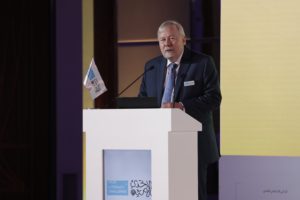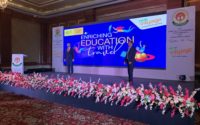Lifelong Learning Is Fundamental For Achieving SDGs
The importance of lifelong learning to achieve the United Nation’s Sustainable Development Goals (SDGs) was one of the topics under discussion during the opening of the Mohammed bin Rashid Al Maktoum Knowledge Foundation’s first Literacy Challenge Forum.
Presenting the subject to the audience, Arne Carlsen, Professor at the University of Latvia’s Faculty of Education, Psychology and Art, highlighted how it was necessary to transform the education sector to encompass lifelong learning systems so that they could teach 21st Century skills beyond literacy. This, he said, would equip school leavers, graduates and employees with the capabilities to both overcome challenges and seize opportunities being presented by the Fourth Industrial Revolution.
Speaking at his session titled ‘Achieving Sustainable Development Goals through Lifelong Learning’, Professor Carlsen outlined how the UN’s SDG 4:, which is to: ‘ensure inclusive and equitable quality education and promote lifelong learning’ was a sea-change in the philosophy of education.
“Let me call your attention to the name of SDG 4 – I think it’s the first time in the history of education that lifelong learning has been put at the same level as education. I’ve never seen it before in my long life working with education. It was not the situation in education for all, it was not the situation in previous development policies at the global or regional level. Now, lifelong learning has become of the same importance of education, in the form of inclusion, in the form of continuing education and training,” he said.
Highlighting how education systems needed to change to meet the demands of the Fourth Industrial Revolution, Professor Carlsen drew attention to the new paradigm of thinking that was driving changes in education to meet the challenges of the future, noting the work done by the International Labour Organization to enshrine lifelong learning as a basic and fundamental right for all people.
“If now our labour markets – parts of our labour markets – will transform and be influenced by robots, Artificial Intelligence, Big Data and automation, then what is the response from the side of education? Well, we will have to transform our education systems so that we can learn new things in relation to the new demands. And it is also clear that automation will replace some kinds of jobs, so that people who will be out of jobs will be able to learn new skills that will make them employable again. Therefore, the ILO has a first recommendation for all countries – and that is to make lifelong learning an entitlement for all, to make lifelong learning a human right, as we have from the 1940s – with the United Nations – made education a human right,” he said.
Professor Arne Carlsen was Director of the UNESCO Institute for Lifelong Learning from 2011 to 2017, where he co-chaired the Global Alliance for Literacy. He was also one of the initiators of the UNESCO Global Network of Learning Cities and the new UNESCO Recommendation on Adult Learning and Education.
The first ever Mohammed bin Rashid Al Maktoum Knowledge Foundation Literacy Challenge Forum is being held under the patronage of H.H. Sheikh Mohammed bin Rashid Al Maktoum, Vice President and Prime Minister of the UAE, Ruler of Dubai, and under the directives of the foundation chairman H.H. Sheikh Ahmed bin Mohammed bin Rashid Al Maktoum. The two-day event concludes Tuesday at the Hilton Dubai Al Habtoor City.






